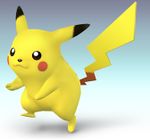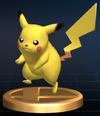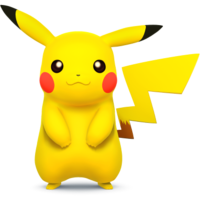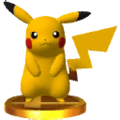Pikachu: Difference between revisions
(New game released, updated accordingly.) Tag: Mobile edit |
|||
| Line 33: | Line 33: | ||
In the main series of video games, Pikachu is a relatively weak Electric-type Pokémon that can be found early in the [[bulbapedia:Pokémon Red and Green Versions|original games]]. Unlike certain special monsters that had plot elements wrapped around them, such as [[Mewtwo]], Pikachu was just another Pokémon that could be caught, evolved into its higher form, Raichu, and had no bearing on the story. However, Pikachu's popularity in the animé, where it was the first and primary Pokémon of the main character, Ash Ketchum, eventually led to it starring in its own specialized version of the Game Boy game (the [[bulbapedia:Pokémon Yellow Version|''Yellow'' version]], which was largely based off the animé), as the first Pokémon that the player obtained. Pikachu's role in the game was intensely elaborated on, as several events on the game depended on how Pikachu felt towards the player. Depending on the player's actions towards Pikachu, the electric mouse Pokémon would exhibit a variety of emotions when spoken to, varying from frustration, to amusement, to complete adoration. Pikachu's happiness was sometimes a prerequisite for certain rewards in the game, such as attaining the three Pokémon that could be chosen as starters from the ''Red'' and ''Green'' versions. | In the main series of video games, Pikachu is a relatively weak Electric-type Pokémon that can be found early in the [[bulbapedia:Pokémon Red and Green Versions|original games]]. Unlike certain special monsters that had plot elements wrapped around them, such as [[Mewtwo]], Pikachu was just another Pokémon that could be caught, evolved into its higher form, Raichu, and had no bearing on the story. However, Pikachu's popularity in the animé, where it was the first and primary Pokémon of the main character, Ash Ketchum, eventually led to it starring in its own specialized version of the Game Boy game (the [[bulbapedia:Pokémon Yellow Version|''Yellow'' version]], which was largely based off the animé), as the first Pokémon that the player obtained. Pikachu's role in the game was intensely elaborated on, as several events on the game depended on how Pikachu felt towards the player. Depending on the player's actions towards Pikachu, the electric mouse Pokémon would exhibit a variety of emotions when spoken to, varying from frustration, to amusement, to complete adoration. Pikachu's happiness was sometimes a prerequisite for certain rewards in the game, such as attaining the three Pokémon that could be chosen as starters from the ''Red'' and ''Green'' versions. | ||
Pikachu has not had a starring role in any of the main games in the series since then, but it has been featured in every prominent hand held RPG since the franchise, usually bringing something new with it each time. In ''[[bulbapedia:Pokémon Gold and Silver Versions|Pokémon Gold and Silver]]'', released for the Game Boy Color in 2000, Pikachu gained a new evolutionary phase in the form of [[Pichu]]. It also gained an item called the Light Ball, which doubled Pikachu's Special Attack when held. However the item was only obtainable when trading a Pikachu over from the ''Yellow'' version. The [[bulbapedia:Pokémon Emerald Version|''Emerald'' version]] of ''[[bulbapedia:Pokémon Ruby & Sapphire Versions|the Game Boy Advance games]]'' gave Pikachu an Egg Move exclusive to it and its family, called [[Volt Tackle]], which was an exceptionally powerful Electric-attack with a large recoil. The [[bulbapedia:Pokémon Diamond and Pearl Versions|''Diamond'' and ''Pearl'' versions]] of the DS title introduced cosmetic differences between genders for certain species of Pokémon, and Pikachu was one of them, with the females having a dent at the end of their tail. The Light Ball also gained a new feature in this game - allowing both Pikachu's normal and Special Attacks to be doubled. | Pikachu has not had a starring role in any of the main games in the series since then, but it has been featured in every prominent hand-held RPG since the franchise, usually bringing something new with it each time. In ''[[bulbapedia:Pokémon Gold and Silver Versions|Pokémon Gold and Silver]]'', released for the Game Boy Color in 2000, Pikachu gained a new evolutionary phase in the form of [[Pichu]]. It also gained an item called the Light Ball, which doubled Pikachu's Special Attack when held. However the item was only obtainable when trading a Pikachu over from the ''Yellow'' version. The [[bulbapedia:Pokémon Emerald Version|''Emerald'' version]] of ''[[bulbapedia:Pokémon Ruby & Sapphire Versions|the Game Boy Advance games]]'' gave Pikachu an Egg Move exclusive to it and its family, called [[Volt Tackle]], which was an exceptionally powerful Electric-attack with a large recoil. The [[bulbapedia:Pokémon Diamond and Pearl Versions|''Diamond'' and ''Pearl'' versions]] of the DS title introduced cosmetic differences between genders for certain species of Pokémon, and Pikachu was one of them, with the females having a dent at the end of their tail. The Light Ball also gained a new feature in this game - allowing both Pikachu's normal and Special Attacks to be doubled. | ||
Pikachu has also been in virtually every Pokémon-related spin-off game ever released, sometimes as the star or a main character, and other times just featured among the hundreds of other Pokémon in the series. Notable Pikachu-centric games include ''Hey You, Pikachu!'' for the [[Nintendo 64]], where the player could talk to Pikachu using the microphone, ''Pokémon Channel'', which is usually regarded as a spiritual sequel to the previous title, ''PokéPark Wii: Pikachu's Adventure'' that has Pikachu as the main character and the ''Pokémon Mystery Dungeon'' games, where Pikachu is one of the Pokémon that the player can start out as. Pikachu has also been made into a Tamagotchi-style virtual pet called the ''Pocket Pikachu'', which was a little LCD device that owners can clip onto their belt. Whenever the user took a step, it would register on the system, which would give Pikachu points in the form of "watts". It is described as quadrupedal. | Pikachu has also been in virtually every Pokémon-related spin-off game ever released, sometimes as the star or a main character, and other times just featured among the hundreds of other Pokémon in the series. Notable Pikachu-centric games include ''Hey You, Pikachu!'' for the [[Nintendo 64]], where the player could talk to Pikachu using the microphone, ''Pokémon Channel'', which is usually regarded as a spiritual sequel to the previous title, ''PokéPark Wii: Pikachu's Adventure'' that has Pikachu as the main character and the ''Pokémon Mystery Dungeon'' games, where Pikachu is one of the Pokémon that the player can start out as. Pikachu has also been made into a Tamagotchi-style virtual pet called the ''Pocket Pikachu'', which was a little LCD device that owners can clip onto their belt. Whenever the user took a step, it would register on the system, which would give Pikachu points in the form of "watts". It is described as quadrupedal. | ||
Revision as of 12:04, December 1, 2014
- For fighter info, see Pikachu (SSB), Pikachu (SSBM), Pikachu (SSBB), and Pikachu (SSB4).
| Pikachu | |
|---|---|
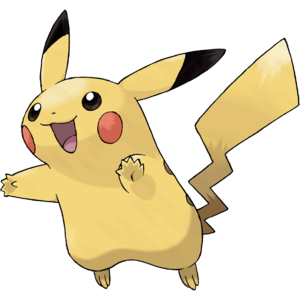 File:PokemonSymbol.png Official artwork of Pikachu from Pokémon FireRed and LeafGreen Versions. | |
| Universe | Pokémon |
| Debut | Pokémon Red and Green Versions (1996) |
| Smash Bros. appearances | SSB Melee Brawl SSB4 Ultimate |
| Most recent non-Smash appearance | Pokémon Omega Ruby and Alpha Sapphire (2014) |
| Console/platform of origin | Game Boy |
| Species | Pikachu |
| Gender | Varies |
| Place of origin | Kanto |
| Created by | Satoshi Tajiri |
| Designed by | Ken Sugimori |
| Voice actor | Ikue Ôtani |
| Japanese voice actor | Ikue Ōtani |
| Article on Bulbapedia | Pikachu (Pokémon) |
Pikachu (ピカチュウ, Pikachū) is a fictional creature in the Pokémon franchise of media. It is one of the most popular and well known Pokémon in the world, and is the main representative or mascot of the franchise and its anime. It appears as a playable fighter and starter in all four Super Smash Bros. games.
Creature description
Pikachu is a small, mouse-like Pokémon with short, yellow fur and brown markings on the back, pointy, black-tipped ears, red circles on its cheeks, and a tail in the shape of a lightning bolt. The extensive variety of Pokédex entries available for Pikachu throughout the RPG series provides plenty of biological information: It lives in forests in groups away from people, and it keeps its tail raised as it monitors its surroundings. The tail is sometimes struck by lightning in this pose, and it will try to bite whatever yanks its tail. Its red cheeks are electricity-storing pouches which appear to become electrically charged overnight while Pikachu sleeps. It occasionally discharges electricity when it is dozy after waking up. Shooting out stored-up electricity from its cheeks is its primary offensive measure; if threatened, angered, or attacked, it discharges the electricity from its cheeks at the offender. When it releases pent-up energy in a full-on burst, the electric power unleashed is equal to a bona fide lightning bolt. When several Pikachu gather together, the collective electricity among them may build and cause a lightning storm. It occasionally uses an electric shock to recharge a fellow Pikachu that is in a weakened state. An intelligent species, it jolts any new thing it comes across as a way of inspecting it. Whenever it comes across a hard berry, it uses its electricity to roast the berry to make it tender enough to eat, and it jolts any new thing it comes across. If one was to come across a blackened berry, it is evidence that a Pikachu mistook the intensity of its charge.
In the main series of video games, Pikachu is a relatively weak Electric-type Pokémon that can be found early in the original games. Unlike certain special monsters that had plot elements wrapped around them, such as Mewtwo, Pikachu was just another Pokémon that could be caught, evolved into its higher form, Raichu, and had no bearing on the story. However, Pikachu's popularity in the animé, where it was the first and primary Pokémon of the main character, Ash Ketchum, eventually led to it starring in its own specialized version of the Game Boy game (the Yellow version, which was largely based off the animé), as the first Pokémon that the player obtained. Pikachu's role in the game was intensely elaborated on, as several events on the game depended on how Pikachu felt towards the player. Depending on the player's actions towards Pikachu, the electric mouse Pokémon would exhibit a variety of emotions when spoken to, varying from frustration, to amusement, to complete adoration. Pikachu's happiness was sometimes a prerequisite for certain rewards in the game, such as attaining the three Pokémon that could be chosen as starters from the Red and Green versions.
Pikachu has not had a starring role in any of the main games in the series since then, but it has been featured in every prominent hand-held RPG since the franchise, usually bringing something new with it each time. In Pokémon Gold and Silver, released for the Game Boy Color in 2000, Pikachu gained a new evolutionary phase in the form of Pichu. It also gained an item called the Light Ball, which doubled Pikachu's Special Attack when held. However the item was only obtainable when trading a Pikachu over from the Yellow version. The Emerald version of the Game Boy Advance games gave Pikachu an Egg Move exclusive to it and its family, called Volt Tackle, which was an exceptionally powerful Electric-attack with a large recoil. The Diamond and Pearl versions of the DS title introduced cosmetic differences between genders for certain species of Pokémon, and Pikachu was one of them, with the females having a dent at the end of their tail. The Light Ball also gained a new feature in this game - allowing both Pikachu's normal and Special Attacks to be doubled.
Pikachu has also been in virtually every Pokémon-related spin-off game ever released, sometimes as the star or a main character, and other times just featured among the hundreds of other Pokémon in the series. Notable Pikachu-centric games include Hey You, Pikachu! for the Nintendo 64, where the player could talk to Pikachu using the microphone, Pokémon Channel, which is usually regarded as a spiritual sequel to the previous title, PokéPark Wii: Pikachu's Adventure that has Pikachu as the main character and the Pokémon Mystery Dungeon games, where Pikachu is one of the Pokémon that the player can start out as. Pikachu has also been made into a Tamagotchi-style virtual pet called the Pocket Pikachu, which was a little LCD device that owners can clip onto their belt. Whenever the user took a step, it would register on the system, which would give Pikachu points in the form of "watts". It is described as quadrupedal.
In Super Smash Bros.
As a playable character
Pikachu's debut to the Smash Bros series is as one of the eight Starter characters. Just like in the games that Pikachu originates from, it is a small, fast character whose play style is prominently dependent on its speed and powerful electric attacks. Pikachu is ranked number one on the original Smash 64 tier list. Pikachu is notable for having several advantages, its amazing edgeguarding capabilities that could even go way offstage, its fantastic recovery skills with Quick Attack covering a huge distance, powerful smash attacks and back throw, and its fast and powerful aerial attacks that can combo very well. Pikachu's neutral special move, Thunder Jolt, shoots a beam of electricity that bounces along the stage. This gives Pikachu incredibly favorable matchups with no negative or even matchups. Its up special move is a fast recovery move dubbed the Quick Attack, and its down special move involves Pikachu striking itself with Thunder, which blasts anyone else standing in the way and it is used in a effective combo named Thunderspiking, where Pikachu uses its up smash to sent an opponent upwards to the upper blast line and follows up with Thunder to KO them.
In-game description:
- Pikachu
- Mouse PKMN
- Height 1'4"
- Weight 13lbs
- When several of these Pokémon gather, their electricity could cause lightning storms.
- (Pokédex excerpt)
- Works:
- Pokémon (GB)
In Single-player
In the fifth level of the game's single-player mode, the player faces Pikachu on the Saffron City stage.
In Super Smash Bros. Melee
As a playable character
Pikachu returns to Melee, once again as a starter character. While its play style is still incredibly similar to its first appearance in the Smash series, Pikachu is not quite as deadly as it used to be. However, it is still a powerful, agile character and a force to be reckoned with, ranking it 10th on the tier list in A tier. Pikachu gains Skull Bash as its new side special move.
In single-player
In the game's single-player Adventure mode, a team of a total of ten Pikachu, Pichu, and Jigglypuff, face the player on the Pokémon Stadium stage, and the only items on the stage are Poké Balls. Pikachu is featured in the following Event Matches:
- Event 7: Pokémon Battle: The player faces Pikachu on the Pokémon Stadium stage. The only method either character can use to damage the other is by using Poké Balls.
- Event 13: Yoshi's Egg: The player, as Yoshi, must defend the Yoshi's Egg item from Pikachu, Fox, and Donkey Kong on the Mushroom Kingdom: Rainbow Cruise stage.
- Event 30: All-Star Match 3: As a character of the player's choice, they must defeat Kirby, Pikachu, Ness, and the Ice Climbers, one after the other.
- Event 48: Pikachu and Pichu: This match takes place on the Past Stages: Dream Land stage, and the player is pitted against two Pichu and a Pikachu with infinite stock. The player must KO the two Pichu to win.
Trophies
In line with the other playable characters, there are three Pikachu trophies obtained by defeating the single-player modes - a normal trophy from Classic Mode, and "Smash Red" and "Smash Blue" trophies from the Adventure and All-Star modes, respectively. The Classic mode trophy reads:
- Pikachu
- It's safe to say that Pikachu is the most famous and popular of all Pokémon. It has electric pouches in both cheeks; when in danger, it shoots electricity at its enemies. Although Pikachu can evolve into Raichu by exposure to a Thunderstone, many trainers like Pikachu so much that they don't let it evolve.
- Pokémon Red & Blue 9/98 (GB)
In Super Smash Bros. Brawl
As a playable character
Pikachu returns once again as a starter character in Brawl. Visually, Pikachu has barely changed at all from its Melee design, only being touched up slightly. However, Pikachu was improved from Melee, becoming more powerful and gaining many new techniques such as Quick Attack canceling and two chain grabs. As a result, Pikachu is ranked 8th on the tier list in B tier. It has all of its moves from the first two games. Like the rest of Brawl's cast, Pikachu also has a Final Smash, a new kind of special attack that was added for Brawl. Pikachu's Final Smash is called Volt Tackle, which involves it turning into a giant ball of light that can be controlled by the player. One downside of Volt Tackle is that it can be considered hard to maneuver. This move operates absolutely nothing like Volt Tackle in the original Pokémon games, and is speculated to be based on a special ability in the Genesis/Mega Drive game Pulseman, Volteccer, which Volt Tackle was apparently based on and named after (in the Japanese versions of the Pokémon series).
Trophy Info
- Pikachu
- A Mouse Pokémon. Its lightning-bolt tail and round cheeks are its trademarks. When danger draws near, it uses tiny electric pouches within its cheeks to discharge electricity. When it's really fired up, it unleashes thunderbolts on its rivals. It's said to recharge when it's sleeping. It evolves into Raichu.
: Pokémon Red/Blue
: Pokémon Diamond/Pearl
Sticker
| Name | Game | Effect | Character(s) |
|---|---|---|---|
| Pikachu | Pokémon series |
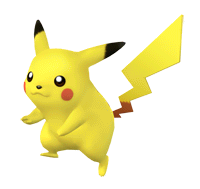 Pikachu (Pokémon series) |
In Super Smash Bros. 4
Pikachu returns as a playable character. Pikachu's design has been updated to look like its more recent appearances, being less chubby and having a brighter color than previous games.
Pikachu was nerfed from Brawl to SSB4, with his Thunder being less useful overall, among others.
Trophies
Super Smash Bros. for Nintendo 3DS trophy descriptions
- Pikachu
- Recognized the world over, Pikachu is an Electric-type Pokémon that stores energy in its cheeks for use in battle. In Smash Bros., Pikachu is a well-rounded fighter with speedy, powerful electric attacks. Quick Attack can be used twice in a row if two directions are input, one after another.
- Pikachu (All-Star)
- Pikachu's Thunder Jolt fires off a ball of electricity that bounces across the stage, getting weaker as it travels. It does more damage to enemies in the air. The default down special, Thunder, causes a lightning strike that both shocks opponents and turns Pikachu invincible for a split second.
- PikachuAllStarTrophy3DS.png
All-Star
Trivia
- Pikachu is the only playable Pokémon in the Super Smash Bros. series to have a gender difference. Male Pikachu looks like the one in Smash Bros, but females have heart-shaped mark at the end of their tail. However, gender differences in Pokémon were introduced in Generation IV, which came out well after Super Smash Bros. and Melee did. Therefore, although not proven, it can be assumed the Pikachu in Brawl and Smash 4 is male.
- Pikachu is the only character in the entire Super Smash Bros series to only have four costume color options in the first three games. He has eight swaps in Smash 4, just like every other fighter.
- Pikachu and Fox are the only characters who are currently ranked at least upper-mid tier in the tier lists of every Smash Bros. game in the series.
- Coincidentally, both have been at the top of a tier list before.
- Pikachu is the member of the Original 8 whose amiibo figure is not compatible with Mario Kart 8.
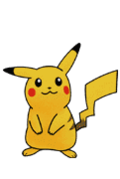
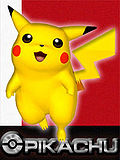
![Trophy [Classic Mode]](https://ssb.wiki.gallery/images/thumb/a/ab/Pikachu_Trophy_Melee.png/80px-Pikachu_Trophy_Melee.png)
![Smash Red trophy [Adventure Mode]](https://ssb.wiki.gallery/images/thumb/7/7e/Pikachu_Trophy_%28Smash%29.png/69px-Pikachu_Trophy_%28Smash%29.png)
![Smash Blue Trophy [All-Star Mode]](https://ssb.wiki.gallery/images/thumb/4/41/Pikachu_Trophy_%28Smash_2%29.png/69px-Pikachu_Trophy_%28Smash_2%29.png)
